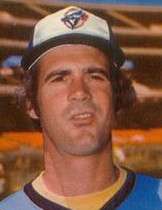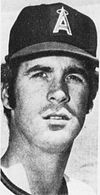Bill Singer
William Robert Singer (born April 24, 1944) is an American former professional baseball pitcher with a 14-year career from 1964 to 1977. He played primarily for the Los Angeles Dodgers (1964–72) and the California Angels (1973–75), spending his final two seasons with the Texas Rangers (1976), Minnesota Twins (1976), and Toronto Blue Jays (1977). His nicknames included "Sing Sing," "Billy No-No" and "The Singer Throwing Machine."
| Bill Singer | |||
|---|---|---|---|
 | |||
| Pitcher | |||
| Born: April 24, 1944 Los Angeles, California | |||
| |||
| MLB debut | |||
| September 24, 1964, for the Los Angeles Dodgers | |||
| Last MLB appearance | |||
| July 16, 1977, for the Toronto Blue Jays | |||
| MLB statistics | |||
| Win–loss record | 118–127 | ||
| Earned run average | 3.39 | ||
| Strikeouts | 1,515 | ||
| Teams | |||
| |||
| Career highlights and awards | |||
Major League career
Los Angeles Dodgers
Singer made his major league debut with the Los Angeles Dodgers on September 24, 1964, allowing one run in 6.1 innings in a start against the Chicago Cubs, as he had a no-decision in a 4-3 loss at Wrigley Field. Singer made one more start in 1964, allowing 4 runs in 7.2 innings in a 4-3 loss to the Cubs at Dodger Stadium.
During the next two seasons, Singer saw very little action with the Dodgers, pitching five innings in five games, as he spent most of his time in the minor leagues.
He had his first full season in Los Angeles in 1967, as Singer had an impressive 12-8 record with a 2.64 ERA in 32 games, 29 of them starts. In 1968, Singer had a very solid ERA of 2.88, however, he had a losing record of 13-17.
During this period, the legendary Dodger announcer, Vin Scully, referred to Singer as "the Singer Throwing Machine."
Singer had a breakout season in 1969, tying with Claude Osteen with a club high 20 wins, as he had a 20-12 record with a club best 2.34 ERA. Singer played in the 1969 Major League Baseball All-Star Game held at RFK Stadium in Washington, D.C., pitching two scoreless innings in the National League's 9-3 win. That year Singer also became the first pitcher to be officially credited with a save. The statistic was made official in 1969, and Singer recorded his on April 7, when he took over from Don Drysdale and secured a 3-2 victory over the Cincinnati Reds at Crosley Field.
He ran into injury problems in 1970, making only 16 starts, but had a record of 8-5 with a 3.13 ERA. After contracting hepatitis early in the season, he made a comeback, being named the NL Player of the Month for July as he had a 5-0 record with a 1.84 ERA. On the 20th of that month, he no-hit the Philadelphia Phillies 5-0 at Dodger Stadium. His season ended when he broke a finger.
Singer was the Dodgers opening day starter in 1971, however he struggled throughout the season, with a 10-17 record and a 4.16 ERA. He continued to struggle throughout the 1972 season, going only 6-16 with a 3.67 ERA.
On November 28, 1972, the Dodgers traded Singer, Billy Grabarkewitz, Frank Robinson, Mike Strahler, and Bobby Valentine to the California Angels for Ken McMullen and Andy Messersmith .
California Angels

Singer had a very strong 1973 season with the Angels, tying a career high with 20 wins, as he was 20-14 with a 3.22 ERA in 40 starts. Singer played in the 1973 Major League Baseball All-Star Game held at Kauffman Stadium in Kansas City, where he allowed three runs in two innings as the American League lost 7-1.
Singer's season was shortened by back problems in 1974. He made 14 starts, earning a 7-4 record with a 2.98 ERA. He struggled in the 1975 season, going 7-15 with a 4.98 ERA.
Texas Rangers and Minnesota Twins
Singer was sent from the Angels to the Texas Rangers for Jim Spencer and $100,000 on December 10, 1975.[1] He began the 1976 in Texas, and pitched well with them, going 4-1 with a 3.48 ERA in 10 starts. On June 1, 1976, the Rangers traded Singer, Mike Cubbage, Jim Gideon, Roy Smalley and $250,000 to the Minnesota Twins for Bert Blyleven and Danny Thompson.
He finished the 1976 season with the Twins, making 26 starts, and finishing with a 9-9 record and a 3.77 ERA in Minnesota.
Toronto Blue Jays
On November 5, 1976, the Toronto Blue Jays drafted Singer in the 1976 MLB Expansion Draft with the 28th overall selection. As a previous 20-game winner, Singer was one of the focal points of the Blue Jays initial marketing campaign. He was nearly traded for Ron Guidry in a transaction approved by the Yankees but vetoed by Blue Jays president Peter Bavasi.[2]
Singer started the Blue Jays' first spring training game on March 11, 1977 at Grant Field in Dunedin, Florida. He surrendered a lead-off homerun to the Mets' Lee Mazzilli before the Blue Jays came back to win 3-1.[3]
Singer was also the opening day starter for the expansion Blue Jays in 1977. He gave up 11 hits and 3 walks in 4.1 innings, and garnered a no-decision in Toronto's 9-5 win over the Chicago White Sox on a snowy afternoon at Exhibition Stadium. Singer struggled with the Blue Jays, and spent six weeks on the disabled list in June and July 1977. Singer was ineffective in his return to the rotation on July 13, 1977 and was moved to the bullpen. On July 16, after a relief appearance, he was shut down for the rest of the season, and never again pitched in the major or minor leagues. He finished the 1977 season 2-8 with a 6.79 ERA.
Singer did not pitch during the 1978 season and was released from the Blue Jays on December 2, 1978. He then retired, finishing his career with a 118-127 record, a 3.39 ERA and 1,515 strikeouts.
Post-playing career
After retirement he held various scouting and consulting positions with Florida Marlins, Pittsburgh Pirates, Los Angeles Dodgers, and the New York Mets.
In 2003, Singer was terminated from his position as special assistant to General Manager Jim Duquette of the New York Mets after Singer disparaged and degraded the Los Angeles Dodgers' assistant general manager Kim Ng for her family's Chinese-American history.[4] Ng was born in Indianapolis, Indiana to American-born parents of Chinese and Thai heritage. Singer's attack on Ng was reported by ESPN and the Los Angeles Times.[5] He later apologized, and blamed the Atkins diet and being drunk as the reasons for his remarks, despite the absence of correlation between the Atkins diet, alcohol consumption, and the disparagement of Chinese-Americans.[6]
He was later hired by the Arizona Diamondbacks as a Major League scout in February 2005, with the Diamondbacks GM Joe Garagiola Jr giving Singer a pass, stating "We satisfied ourselves by talking to him, to other people about him and doing a thorough background check."[5] In November 2006, the Washington Nationals rewarded Singer by hiring him to coordinate scouting operations in Asia.
References
- Koppett, Leonard. "Phils Obtain Kaat In 5‐Player Trade," The New York Times, Thursday, December 11, 1975. Retrieved May 1, 2020
- Wilson-Smith, Anthony. "How the Blue Jays did it," Maclean's, September 30, 1985. Retrieved February 29, 2020
- "Jays' opener a 3-1 success". St. Petersburg Times. St. Petersburg, Florida. March 12, 1977. Retrieved July 26, 2020.
- SApp/mlb/nym/news/nym_press_release.jsp?ymd=20031118&content_id=605478&vkey=pr_nym&fext=.jsp&c_id=nyn.
- ESPN – Report: 'No way' Singer can save job – MLB
- Boston.com / News / Boston Globe / Living / Arts / Baseball executive strikes out; ballet receives a lift
External links
- Career statistics and player information from Baseball-Reference, or Fangraphs, or Baseball-Reference (Minors)
- Baseball Library
| Preceded by Clyde Wright |
No-hitter pitcher July 20, 1970 |
Succeeded by Vida Blue |
| Preceded by Tommie Agee |
Major League Player of the Month July, 1970 |
Succeeded by Bob Gibson |
| Preceded by Claude Osteen |
Los Angeles Dodgers Opening Day Starting pitcher 1971 |
Succeeded by Don Sutton |
| Preceded by None |
Toronto Blue Jays Opening Day Starting pitcher 1977 |
Succeeded by Dave Lemanczyk |